
DiEM25 demands: no extradition of Julian Assange to the United States
Julian Assange’s extradition hearing begins on February 24.
We demand that Julian Assange not be extradited to the USA! We are therefore calling for a protest march from Australia House to Parliament Square in London on February 22.
What: March Don’t Extradite Assange protest
#AssangeCase #FreeAssange
Where:
Australia House to Parliament Square, London
When?
Time: 11:30 – 15:30
11:30: People start assembling at Australia House, Strand, London, WC2B 4LA
12:15: Photo prior to start of march
12:30-13:30: March from Australia House to Parliament Square
13:30 – 15:30: Speeches and musical performances at Parliament Square
Who:
- Roger Waters – Musical Performance
- Yanis Varoufakis – Co-Founder DiEM25
- Chrissie Hynde – Musical Performance
- Brian Eno – RDI, musician – Will make a statement
- M.I.A. – musician – Will make a statement
- Lowkey – musician – Rap Performance
- Kristinn Hrafnsson– Editor in chief of WikiLeaks
- Vivienne Westwood – Fashion designer
- John Shipton – Julian Assange’s father
A large protest march against the extradition of DiEM25 Advisory Panel member, Julian Assange, will take place in London on February 22, 2020, organised by the “Don’t Extradite Assange” campaign.
The Trump administration has issued 17 charges of espionage against Assange which could mean 175 years in high-security prison in the United States, if he ever survives the already dire conditions in Belmarsh Prison in the UK. This is the first-ever time such a charge has been levelled against a journalist with the threat of life imprisonment.
On November 6, 2019, DiEM25 co-founder Srećko Horvat spoke in London at an event organised by the “Don’t Extradite Assange” campaign, warning that “Europe will lose its democracy if it loses Julian Assange”.
Assange’s deteriorating health conditions, particularly since entering solitary confinement on the health ward at Belmarsh, have been of ongoing concern. Following a medical visit in May, UN Special Rapporteur on Torture, Nils Melzer, reports that Assange was suffering from psychological torture. Last month, more than 60 doctors signed an open letter calling on Belmarsh to release Assange to receive proper medical care immediately, warning he could die in prison without adequate treatment.
Assange’s defense will include evidence from the Spanish investigation into the surveillance of UC Global, a private security company which spied on Assange’s legal, medical, and personal visits in the Ecuadorian Embassy in London, including the DiEM25 co-founder Srećko Horvat, and sent recorded material to the CIA.
UC Global director David Morales has been arrested in Spain in connection with the illegal surveillance, an astonishing intrusion of Assange’s privacy. Assange is due to testify by video link in the Spanish trial tomorrow.
Assange’s next extradition hearing is scheduled for February 24, 2020.
DiEM25 co-founder Yanis Varoufakis will, together with Julian’s father and other supporters, speak at the protest. Yanis Varoufakis will also visit Julian Assange in prison on February 23.
For press inquiries and individual interviews with Yanis Varoufakis please contact:
Claudia Trapp, at [email protected]
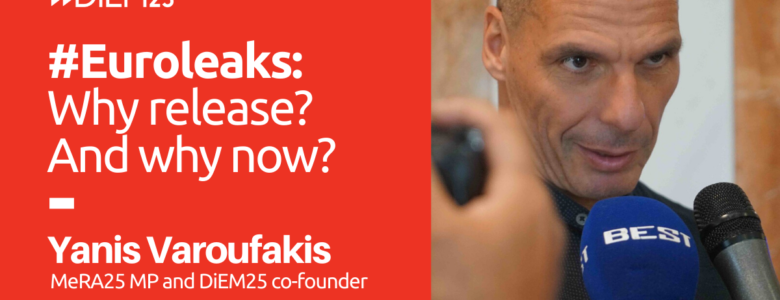
#Euroleaks: Why release? And why now?
During 2015’s first half, as Greece’s finance minister, I participated in thirteen crucial Eurogroup meetings – before the SYRIZA government (disrespecting the referendum result of 5th July) capitulated. The result of that capitulation was my immediate resignation and a permanent austerity program (until… 2060).
From the beginning, the first Eurogroup, it was clear that the troika leaders dominating those meetings were determined to prevent any serious debate on Greece’s ‘program’. I would arrive with a determination to find an honourable compromise on the basis of apt technical proposals the purpose of which was to help the people of Greece breathe again while minimising the costs to our creditors (that dominated the Eurogroup).
In sharp contrast, the troika leaders, and their complicit finance ministers, would stonewall while refusing to discuss my proposals or to counter-propose anything that made financial, political or moral sense. Again and again they demanded our government’s surrender to a neocolonial, austerity, neocolonial program that they themselves, behind closed doors, confessed it had failed!
After the first three Eurogroup meetings I realised, to my horror, that no minutes were being taken down. Moreover, the absence of any record of what was being said allowed the troika apparatchiks to indulge in an orgy of leaks and innuendos that very quickly spread worldwide.
It was a major Operation in Truth Reversal: The troika was leaking that I would come to the meetings unprepared, without technical preparation, and that I was, instead, boring my colleagues to death with ideological or theoretical speeches that were besides the point.
It was my first, real, and very painful, exposure to the true meaning of fake news.
To be able to brief my PM and parliament accurately on what went on in those interminable meetings, as well as to defend myself from the distortions and downright lies regarding my interventions (as well as of the lies of what the troika folks were saying to me), I began recording the proceedings on my smart phone.
Not wishing to keep this secret, I made this public in an interview with the New York Times – as a means of warning the purveyors of fake news that I could prove they were spreading lies. The reaction of the European Commission was one of fake outrage – but, interestingly, they stopped leaking!
Later, I published my memoir (ADULTS IN THE ROOM) which I based, to a large extent, on those recordings – thinking that it would be the end of the story.
Why am I bothering you now with this 5-year old story?
Because, for reasons I shall outline below, MeRA25-DiEM25 and I have decided that now is the right time to make the said recordings available to the public.
Why now?
After publishing ADULTS IN THE ROOM, I was not planning to make the unedited recordings public even though, for three years after the book’s publication, and especially here in Greece, the fake news of 2015 are still being peddled as facts. Having distilled in ADULTS most of what mattered, I was prepared to let the matter rest.
However, last week two events here in Greece changed my mind:
- The new right-wing New Democracy government recently legislated the sale of non-performing mortgages to funds that will trigger mass evictions of families that, due to the never ending crisis, cannot service their mortgages. From 1st May, a new wave of misery is going to engulf our already defeated population. In Parliament, where I lead MeRA25 (DiEM25’s new progressive party in Greece), the PM and his ministers took turns to ‘explain’ what they are doing by blaming their new liquidationist drive on… me and the manner in which I ‘upset’ my finance minister colleagues in those Eurogroup meetings of 2015!
- My former government colleagues (SYRIZA) have just leaked an internal review of what they did wrong since 2014 and why they were defeated in the July 2019 general election. Their main conclusion seems to be that their finance minister in 2015 (me!) antagonised his colleagues in the Eurogroup, failing to table reasonable proposals, being recalcitrant etc. (i.e. SYRIZA adopted fully the troika’s narrative).
In view of 1 and 2 above it is now abundantly clear to me that the fake news concerning the 2015 Eurogroup meetings are providing the cover for a new wave of assaults against the weakest of citizens. For this reason, in a Parliamentary debate on matters pertaining to labour law involving party leaders (last Friday 14th Feb), I addressed my detractors directly:
“You have spent 5 years”, I told them “lying about what was going on in these Eurogroup meetings. Now you are building upon those distortions new austerity and liquidation legislation. For this reason, before Members of Parliament can cast an informed vote on these bills, they have a right and a duty to know exactly what was being said in those Eurogroup meetings.”
At that point, I read out a Greek High Court decision advising that such recordings are fully legal (provided they do not pertain to the participants’ private life and are recorded in the course of one’s public duties). Then, I took out an envelop containing a USB stick with all the recordings in my possession and submitted it to the House’s secretariat saying that I leave it to the Speaker of the House to decide how he would make the material available to MPs and the public at large.
Soon afterwards, a police officer returned the USB stick to my office, on the orders of the Speaker who deemed my gesture ‘unacceptable’. A few hours later, I issued a statement that DiEM25-MeRA25 will, in view of the Speaker’s stance, release the material to the public.
“You have been telling stories about what went on in these meetings, as if you knew exactly what was said, but now you panic at the thought of finding out what was really said”, we added.
What is the significance of these recordings beyond Greece?
These recordings/transcripts make for fascinating listening/reading for those who want independent insights into the decision-making process within the EU:
- Europeanists have much to learn on how Euroscepticism, Brexit being a case in point, was aided and abetted by the unacceptable decision-making process at the heart of the EU. Learning these lessons is a prerequisite for reforming, or better still transforming, the EU.
- Eurosceptics will, unfortunately, find evidence in these recordings that their attitudes are justified.
- Students of international relations, European studies, finance and economics will gain invaluable insights in how flimsily crucial decisions for the world economy are reached.
- And, finally, since democracy without transparency is utterly impossible, the release of these files is a small, but not insignificant, service to democrats around the world.
WATCH THIS SPACE: diem25.org and mera25.gr for the release of the unedited recordings around March 10, 2020 (once transcripts have been produced and made properly accessible to everyone).
Sign up to the DiEM25 newsletter (https://i.diem25.org/newsletter) if you want to be informed the moment DiEM25 publishes the recordings and transcripts.

DiEM25 blows the whistle on the European Establishment
For the past five years, the Greek parties that capitulated on their country’s struggle for freedom in 2015, have been reproducing the Troika’s propaganda, that Yanis Varoufakis was going to the crucial Eurogroup meetings of 2015 without concrete proposals, tired his colleagues with abstract theoretical lectures, delayed negotiations and, in general, stumbled his way through his tenure.
This narrative is the thin thread on which their political legitimacy depends. Today, five years later, he has given his critics an excellent opportunity to challenge him based on the facts, not on unsubstantiated allegations.
On Friday, February 14, Yanis Varoufakis submitted, in digital form, the complete recordings of the Eurogroup meetings he participated in, to the members of the Greek Parliament, at the discretion of the President of the Parliament.
The reaction of the Establishment was sad, albeit predictable. The President of the Parliament immediately rejected the recordings as inadmissible, even though they had already been received by Parliament’s minute-keepers, and the national High Court of Greece has ruled that the recordings are legal.
THE HARD TRUTH
Contrary to the Establishment’s propaganda, the Greek delegation was the only one making technically sound proposals (e.g for smart debt restructuring, for a public debt management company, for a rational VAT system, for an algorithmic method to combat tax evasion, etc.)
Contrary to their propaganda, Schäuble, Dijsselbloem, Draghi, Lagarde and co. came to the Eurogroup without a single suggestion, even stubbornly refusing to read the Greek proposals.
These recordings prove this without a shadow of a doubt.
WHAT’S NEXT?
DiEM25, and MeRA25, refuse to submit to the Establishment’s suffocation of the truth. Citizens have the right to access the conversations that guided the events that so brutally affected their lives.
No one has the right to keep a sovereign Parliament, nor citizens, in the dark. This is why around March 10 we will release all recordings, so that all European citizens finally get to see the hypocrisy of the Establishment and the despicable way in which governments behave, in their name, behind closed doors.
Truth is not only revolutionary, as we once said, but also very useful. The truth sets us free, clarifies who stands on whose side, and helps us better understand who stands in our way to democratise Europe.
Carpe DiEM25

The crisis of centrist politics
Members of our movement often compare the current political situation with that of the 1930s. Yanis Varoufakis has often pointed out the parallels, regarding the historical connection to the rise of extreme right-wing parties and high unemployment throughout the eurozone.
“Society is fragmented, fascism and racism are on the rise,” he warned in May 2019 on Deutschlandfunk Nova.
In fact, exactly a hundred years ago – in 1920 – a few things happened that seem disturbingly familiar to us: on January 26, 1920, Matthias Erzberger, German Reich Minister of Finance, was assassinated by a young officer incited by right-wing hate propaganda. He barely survived.
The assassin Oltwig von Hirschfeld got away with 18 months in prison. The right-wing conservative press could hardly contain its malice. At the same time the Hohenzollern family was wrestling with the state over their property, including a rent cap (by then a party line of the SPD) which kept homeowners on tenterhooks.
All of this does not necessarily mean that history is now repeating itself “as farce”, but it is still worthwhile noting that our present is hardly as modern, post-ideological and depoliticised as some claim and that the past is anything but outdated.
After liberal politician Kemmerich, from the German liberal-centrist party FDP, was elected Prime Minister of Thurinigia on February 5, 2020, with the help of the right-wing party AfD, the establishment media rolled over with indignant contributions:
“February 5, 2020 will go down in history as the day on which the AfD helped a politician gain power in a German parliament for the first time,” says right-wing extremism researcher Matthias Quent in a newspaper interview.
Guy Verhofstadt, otherwise blessed with a thick skin when it comes to “confidence and supply” deals between members of his ALDE faction and neo-Frankist party VOX in spain, went all out on Twitter:
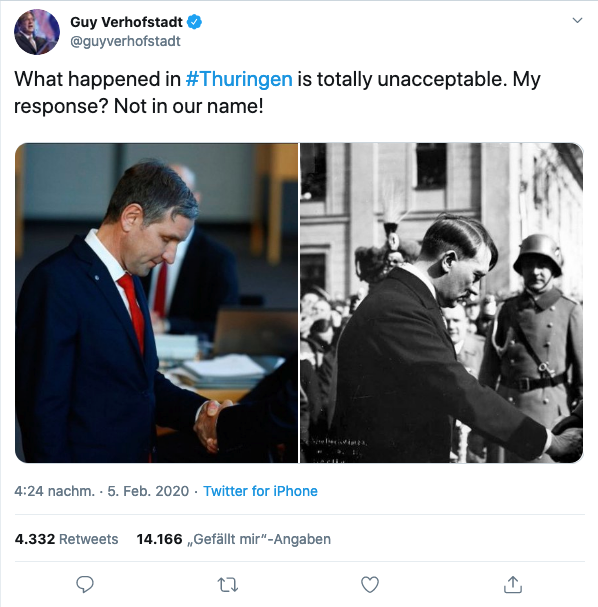
The facts in the matter are quite correct: instead of showing that a government with right-wing support is not an option, the Liberals and Conservatives of the german province Thurinigia humbly accepted it. The AfD is thus in a strategically favourable position. They show their own voters willingness to “take responsibility” and can still continue to score points with hard opposition policies.
At the national level this was accompanied with disgust from all political camps. Even stalwart conservatives like Markus Söder or Paul Ziemiak got the memo that it might be too early for such dangerous political manoeuvre.
German journalist and writer Georg Diez, however, does not want to let German liberals and conservatives get away with it that easy. On Twitter he drew the following conclusion: “the same conservative or, well, liberal publicists and politicians that are now playing the blame game, have helped prepare exactly what is happening now …”
The rise of the right can be observed throughout Europe and is linked to a growing fear of the future. The media are fanning the flames of fear. Climate change is challenging our way of life. The power of international corporations and the financial world has become excessive in our globalised economic system. And our national democracies do not appear to be up to the challenges. The fears arising from this are benefiting the right.
Liberal centrist politics has no remedies whatsoever to cope with the ideological revenants, except to raise its moral index finger and reflexively wake up when a politician is murdered, a synagogue is raided or an arsenal of weapons, collected from a fascist, is found.
However, things have to be middle-of-the-road again, quickly. After all, they are not prepared to change anything and stick to their anachronistic style of post-politics. The Left is as bad as the Right, they say, citing the famous horseshoe theory: there are only two major forces: moderates and extremists (left and right).
The neo-liberal narrative of the “end of history”, the slogan “There Is No Alternative”, the liberal centrism, they all made us forget that politics is a battlefield of interest groups and not a means to an end to impose “unpleasant, but objectively correct decisions”.
We must bury the concept of the political centre, because fewer and fewer people feel that they belong to this already vague construct. It is easy for the AfD to mock its colleagues and their “Lügenpresse” (German term for alleged state-crafted fake news) who preach endlessly about personal responsibility and civil liberties. Not only do right-wing voters suspect that there is a deep ditch in society about which nobody really wants to talk.
As Chantal Mouffe writes in her book “For a Left Populism”, we have to learn again to understand politics as a battlefield of interest groups. This does not necessarily mean that we are confronted with enemies, but with adversaries. We need this new phase of democracy, in which people don’t assume “socialist reign of terror” when politicians speak of rent caps, workers’ cooperatives, Modern Monetary Theory (MMT) or public healthcare.
We need a new democratic project, a project that offers solutions to the immense challenges of our time. It has to revitalise our democracy and work for the necessary change in parliaments, on our streets and in our living rooms. We need a positive narrative for migration, a debate about a possible world after endless growth, ideas about democracy in the workplace, a universal basic dividend – fed by the common ownership of resources – and a vision for technological sovereignty.
DiEM25 is one such project and has progressive, positive and life-affirming concepts. We open a new perspective and show that it is possible to connect the different levels.
As a movement on the streets, like on March 28 in Luxembourg against the tax avoidance of the rich and powerful. With our Electoral Wings in the parliaments, like MeRA25 in Greece and Demokratie in Europa in Germany. And as a topic of conversation in peoples’ living rooms about a new exciting project that is worth joining.
Article by Johannes Fehr (Board member of Demokratie in Europe – DiEM25) and David Schwertgen (DiEM25 Gerrmany National Collective)
Photo (C): Signs by Oliver Groß (CC-BY-NC-ND 2.0)
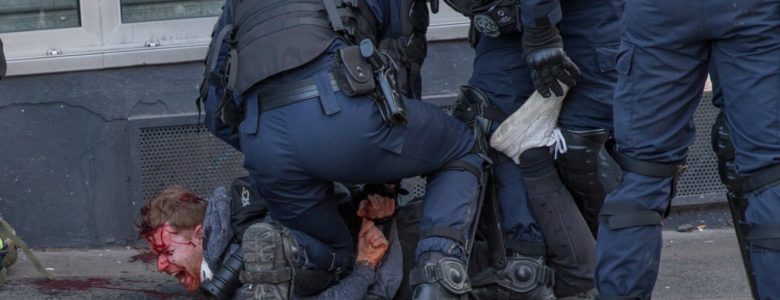
Police violence on the rise in France
On January 30, 2019, already one year ago, the Council of Europe, through its Commissioner for Human Rights, expressed “very serious concerns” about the seriousness of the injuries caused by the French police forces to the Gilets Jaunes (the Yellow Vests). Later in February 2019, the European Parliament and the UN strongly condemned the disproportionate use of police violence in France.
What about one year later, on the 51st day of protests involving members of almost all professions (nurses, electricians, lawyers, doctors, teachers, university professors and researchers, dockers, sewer workers, gas workers, train drivers, subway drivers, radiologists, postmen, labour inspectors, etc) against the neo-liberal measures of Emmanuel Macron’s government?
One year later the picture is frightening, a fortiori in a democracy.
- Three deaths: an old lady targeted at her window by a grenade; a young man pushed into the Loire River and not saved from drowning by the police forces in attendance, who themselves have hidden the fact for weeks; and a man pinned to the ground, whose larynx was broken and died suffocating during an identity check no later than ten days ago, whereas this method of arrest is prohibited in LA and NY and in entire Europe);
- Thirty five people have been blinded by being shot with “flashbang grenades”;
- The hands of five protesters have been torn by explosive grenades;
- 318 severe head injuries have been sustained by protesters;
- An estimated 6,000 persons have been injured.
Over the past two years, the Ministry of Interior Affairs order, roughly every six months, around 40,000 grenades that can be fired at 472kph (category A2 war weapons), thousands of single-shot and semi-automatic flashball launchers (banned in all democratic countries, yet in France around 13,000 shots were fired alone in 2019), tear gas launchers and more recently 25 million assault rifle bullets.
In Paris, armoured vehicles are being deployed, whilst hundreds of police motorcyclists, each with a driver and a passenger carrying a bat, are utilised to “accompany” demonstrators every week; where in fact the purpose is to assault people.
France is at war. No! Macron’s government is at war with its citizens.
Worse still, over the last twelve months the policy of the Ministry of Interior Affairs has dramatically changed. Since 1968, police prefects have been instructed to avoid direct contact with and injuries to demonstrators. Defend but never attack (“to hit a demonstrator on the ground is to hit yourself“). Dispersal was done at a distance.
In the past year direct contact and physical repression have been encouraged, applied by self-constrained police forces pushed to the limit due to lack of leave and overtime. Every day shows a new escalation in the violence. By law, police and gendarmerie have a legal monopoly on violence; provided that, violence is: (a) duly authorised by the hierarchy, (b) objectively justified; (c) proportional to the danger; and (d) defensive in nature.
In the past year, the use of violence has been applied outside these parameters i.e. illegally. It has been applied in a systematically and massively disproportionate and aggressive manner in demonstrations as denounced by international organisations. Where the rule of law is scorned, democracy disappears.
New methods are also now being devised and used against the public during demonstrations and strikes: for example, the use of drones, sophisticated video equipment and undercover police officers infiltrating groups of demonstrators at times even disguised as “black blocs”.
Preventive arrests of people with, for example, more than one yellow vest in their car have now become commonplace. Searches without just cause are now everyday events. Humiliations, insults and provocation by the police as witnessed by French DIEM25 members are the order of the day!
New laws have come into force allowing people to be banned from large geographical areas and for long periods of time in order to avoid demonstrations. The new crime of wearing balaclavas during demonstrations has been rolled out, punishable with jail sentences of up to one year and fines of up to €15,000. Meanwhile, the police has itself ordered 80,000 balaclavas for its own officers in order that they may not to be recognised by demonstrators (presumably to also protect the identity of policemen applying undue violence against members of the public).
An actual system has been implemented unworthy of any democracy. Welcome to the “land of human rights” as Macron once named France!
Calls for the resignation of the Minister of the Interior and the government have multiplied over the past year, coming from politicians, regular citizens, ophthalmologists, human rights organisations. But the government is instead increasing the repression – including against children, disabled persons and elderly people. Police forces are being encouraged by their hierarchy to lodge complaints against demonstrators in an effort to intimidate them.
The notorious case of a disabled lady in a wheelchair in Toulouse accused by the police of having attacked its officers during a demonstration shows how ridiculously far the situation has reached. The authority in charge of investigating violence and crimes of the French police forces against citizens (the IGPN) is part of the Ministry of Interior Affairs. Unsurprisingly, the IGPN has never found sufficient evidence of illegal action by any police force against its citizens.
Fortunately, more and more people are filming the actions of police forces around France and posting them on social networks. This is thus helping to combat against this strategy. Consequently, certain MPs of LREM, Macron’s political party, are now asking for a law to forbid the filming of police forces in action, a crime that would be punishable with a fine of €15,000.
The purpose of the government’s strategy is to scare citizens from demonstrating. The pictures of blinded Gilets Jaunes, both young and elderly, with bloodied skulls have produced the desired effect and lots of people are by now too scared to attend demonstrations or allow their family members on the streets.
By being unfamiliar with the exercise of power and obviously unaware of the determination of the French population, Macron has failed in his strategy.
French people have started to adopt other forms of protests: ballet dancers of the Paris Opéra have danced their anger on the external stairs of the opera house; the choir and the symphony orchestra of the state-owned radio unexpectedly started to perform Nabucco’s “Chorus of Slaves” during the new year wishes of their employers; protesting lawyers threw their black gowns at the feet of the Minister of Justice and have even began to regularly perform a New Zealand style hakka in public; teachers have built walls of class books blocking the entrance of the local LREM MPs’ offices; and last night citizens of French cities and big towns have organised torch lit processions to make it impossible for police forces to identify who and where to shoot.
Under pressure, cornered and worried for his reputation ahead of Davos, Macron recently indicated that the strategy currently being employed by the police will have to be modified by the Minister of Interior Affairs. Following this the minister immediately passed the blame to his police prefects (in particular to the zealous police prefect of Paris who was himself appointed by this same Minister of Interior Affairs after his predecessor had refused to make use of flashball launchers).
Will this have any consequences on our daily life?
Democracy is fragile. We, DIEM25, invite Europeans to stand up in solidarity with all citizens demonstrating for their rights. Wherever in the world. Sometimes this being surprisingly closer to home than our fellow Europeans might realise!
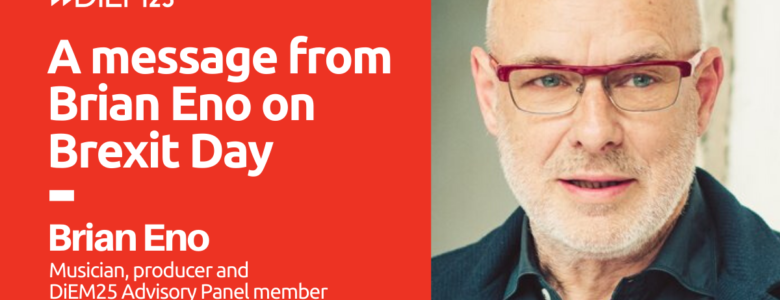
A message from Brian Eno on Brexit day – and a reply
I just wanted to tell you that, although my country has made the insane, childish and probably suicidal decision to leave Europe, I remain proud to be a European, and proud of the great social experiment that the EU represents. In my mind, I’m still in Europe, and that is where I will stay. For England it’s all over now, and the next generations will judge the results.
But I’m writing because I want to tell you what happened to England.
There were all the systemic ingredients you probably know about – a corrupt and deceitful press owned by a handful of very rich people; an absurd and carefully nurtured illusion about England’s Imperial past; a media establishment that thrives on attention and clicks and therefore amplifies the political chances of entertainers like Trump and Johnson; a social media ecosystem which drives polarisation rather than compromise, and a series of undistinguished leaders who apparently understood nothing of any of these systemic issues.
But there was something else too, and this is the point of this letter: those of us who call ourselves liberals or socialists or democrats weren’t paying attention. Most of us didn’t notice that for working people conditions were becoming bleaker every year. And we didn’t notice that the gutter press was relentlessly directing the blame for those conditions towards the victims – the immigrants, the poor, the social workers, the teachers, the foreigners…and most of all, the EU.
We didn’t notice because for us life wasn’t too bad – we all had our iPhones and apps and Amazon accounts and cheap flights to seasides and other ways of wasting our time. Meanwhile there was a revolution going on.
We didn’t recognise the revolution because we always thought it was us who were supposed to be the revolutionaries. The revolution happened, and we were sitting on our backsides watching Netflix.
I’m pretty confident that your countries too will soon face Exit campaigns – if they haven’t already. The EU is an easy target for any ambitious politician: Want to become a big name in politics? Identify a problem, blame it on the EU, and then ride the Nationalist horse with all the help the media can (and inevitably will) give you.
Please, my friends in Europe – don’t make the stupid mistakes we made. Don’t just laugh at people like Trump and Johnson and all the others, because soon they will eat you. If we want a unified Europe to survive, we need to be defending it now. Talking about it. Thinking about it. Making it better. Making it work.
Best of luck to you all and hope to see you again in a generation or two.
On Brexit day, on behalf of DiEM25, I sent you, our comrades in Britain, the following: By leaving us, you are making us sadder, poorer and more prone to the errors that made so many of you vote for Brexit.
The only solace I take from your departure is the thought that Brexit will convince you that a European Union should be invented even if it did not exist. And that it will convince us, on the Continent, to democratise properly the one we have so as to serve our people’s needs and, yes, to lure you back as well.
Nothing ended. The struggle for Britain, France, Germany, Greece, Europe more broadly has not even begun yet. Let’s enjoy it!
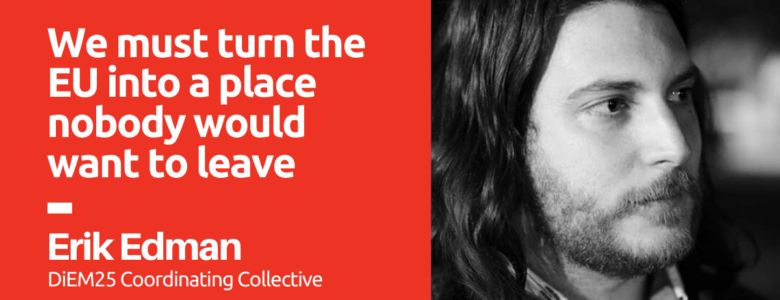
A democratic EU is possible but we must do more than just imagine it
Arms linked in teary embrace; Members of the European Parliament sang farewell to their British colleagues after having finished the vote on the UK’s Withdrawal Agreement on Monday evening in Brussels. Party affiliation, nationality or Brexit stance seemed to have been suspended for the duration of the song, or at least evaporated by the genuine human warmth of the moment.
It was a historic occasion, and MEPs rose to meet it with a gesture that exhibited the very best of what the United Kingdom was leaving behind: unity in diversity, transnational cooperation, and true links of friendship forged with fellow Europeans over the past decades.
For many who have been following not only the UK calamity, but the EU’s slow disintegration since the economic crisis hit in 2008, this occasion is yet another profoundly sad, but eminently predictable, chapter in the ambitious European project’s crumbling. And it carried within it the markings of any great tragedy: many flawed but fundamentally good lawmakers grieved over a misfortune that breaks their heart but which is largely their own construction.
MEPs who have supported austerity, who have curbed migration and approved concentration camps on Greek islands, or who have co-operated with those rolling out misanthropic policies for decades; they all sang Auld Lang Syne hand-in-hand and shed bitter tears on the occasion of the EU losing one of its members. A member which is leaving because a national referendum instructed its government to do so, shocking many with the decision.
But is it really that surprising? No union can sustain the levels of hypocrisy, double-standards and antagonism seen within the EU since the economic crisis first forced its mask to slip. The handling of the economic crisis through the suppression of democracy and the implementation of inane austerity (the best example of which practice remains Greece and the still ongoing downgrading of the nation, a bitter decade later), the lack of solidarity in responding to the so-called refugee crisis, and now, most tellingly: Brexit.
One of the greatest achievements of the story-spinning mechanism in Brussels has been to manage to portray Brexit as a fool-hardy, ill-informed decision taken by citizens in a referendum that should never have happened, instead of what it really is: the failure of the EU to persuade Europeans that its existence is benevolent.
Each crisis offered the EU an opportunity to recognise and deal with its failings, but each was thwarted with the typical bravado of technocrats who think they know best and the opaque authoritarianism of governments that have worked hard to create the ideal space in which to play their power-games unhindered. The EU’s need for radical change that re-imagines the project closer to its citizens and grants them the same sovereign power over their European government as they have over their national one, is long overdue.
The solution to fixing Europe is not further educating citizens into understanding how much Big Brother loves them, nor does it lie in coercing citizens until they make the “right decision”. Europe will be saved by being democratised, and with the Union transformed into a space of real shared prosperity: a space that its citizens would not want to leave.
This is a project that calls for all Europeans, regardless of EU citizenship status, to contribute. We must recognise those who are standing in the way of this progress and refuse to legitimise them with our cooperation, and acknowledge those whose experiences have led them to oppose the EU.
This campaign has been in the making for the past three years, and it is now entering a critical stage: the Democracy in Europe Movement 2025 (DiEM25), unites disparate citizens, engaged in various struggles, around the continent under the one banner that can strengthen them all: the fight for a united, democratic European Union.
The EU was formed in the aftermath of the Second World War: preserving it by helping it evolve into a democracy is our duty as democrats, humanists, and lovers of peace. We owe it to our continent and its people, for auld lang syne.
The views and opinions expressed here are those of the author and do not necessarily reflect DiEM25’s official policies or positions.
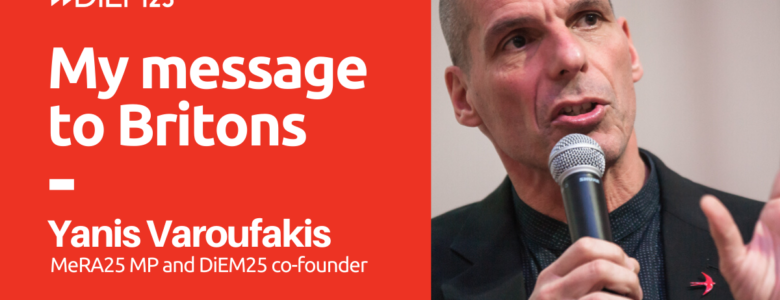
My message to Britons on Brexit day
By leaving us, you are making us sadder, poorer and more prone to the errors that made so many of you vote for Brexit.
The only solace I take from your departure is the thought that Brexit will convince you that a European Union should be invented even if it did not exist.
And that it will convince us, on the Continent, to democratise properly the one we have so as to serve our people’s needs and, yes, to lure you back as well.
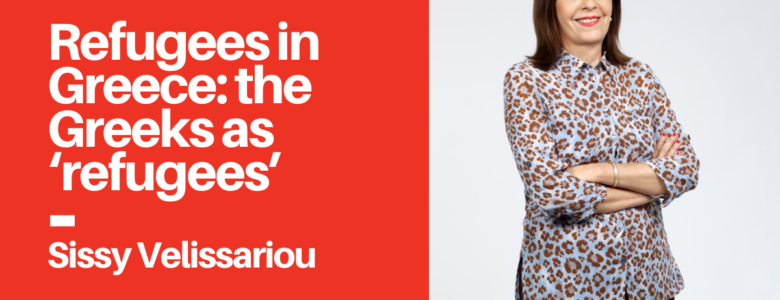
Refugees in Greece: the Greeks as ‘refugees’
Abstract
The state of economic emergency under which Greece has been put for the past eight years throws into relief the basic antinomy inherent in democracy. This pertains to the exercise of national sovereignty on the basis of borders whose safe-guarding, however, implements a network of state practices of control and selection of populations both ‘within’ and ‘out- side’. In Greece, under the memoranda imposed by the Troika (involving four institutions: IMF, ECB, ESM and EC, not three as in Troika), extreme austerity has created ‘superfluous’ populations within their own country. The internal shifting of the borders that produces exclusion, sustained by parliamentary dictates and intense supervision because of the Troika’s policies at the national level, goes along with the stiffening of external border control by the state in a strategy of deterrence against the entry of war refugees into the country. At the same time, the regulation of ‘superfluous’ refugee populations replicates the biopolitical model of EU governance introduced to the national ‘body’. Therefore, the Greek radical Left has to demonstrate that both dispossessed Greek subjects and refugees are victims of globalised capitalism, distance itself from humanitarianism and politicise solidarity by creating the terms for a common struggle.
Introduction: the Greek case
Since 2007, as a result of the memoranda imposed by the Troika on Greece (involving four institutions: IMF, ECB, ESM and EC, not three as in Troika), state policies of internal devaluation and extreme austerity brought about the shrinking of the Greek economy to a level lower than that of Germany’s during 1913–1920 (Laskos and Papadatos- Anagnostopoulos 2016, 22) and a humanitarian crisis unprecedented for a European country.
Greece’s economic demise and the abolition of popular sovereignty ignited a popular radicalism which brought down all the memoranda governments and made the lack of political representation a central issue for the first time since the Second World War.
The people en masse no longer recognised in the old parties of the Greek oligarchy the moral and political right to represent them and, by consequence, the dual-party system consisting of the right-wing and social democratic parties was fundamentally delegitimized. This systemic crisis was produced by an intense class struggle between the impoverished majority and the memoranda forces as well as their political representatives in the government.
At this historical conjuncture, Syriza has managed to express the radical demand for Greece to be released from the bonds of severe austerity and for its people to regain their dignity. In January 2015, it was elected as the first Leftist government in Greek history.
Before the elections, Syriza had warned that the memoranda introduced not just a series of painful measures, but a monolithic and rigorous programme of extracting power and wealth from the working classes and shifting them to the rich. Strategies of profound redistribution of wealth are the case in the vast majority of major capitalist crises, but in post-memoranda Greece they are implemented in the context of a peculiar state of exception. This does not take the form of general measures that suspend the judiciary and affect the constitutional order.
Neither does it produce a space – as suggested by Butler (2006, 67) in reference to Giorgio Agamben’s well-known notion – where ‘certain subjects undergo a suspension of their ontological status as subjects when states of emergency are invoked’. Instead, it is imposed by the emergency powers of ‘the sovereign’, the Troika, which targets the vast majority of the Greek population at all levels. In fact, the memoranda serves the needs of the most aggressive sections of capital, such as hedge funds, monetary financial institutions and others, while at the same time, the indigenous capitalists profit from the large-scale deregulation of the labour market.
It is the Troika that regulates an excessive debt crisis that amounts to 179% of the GNP (a level which has been recognized as non-viable even by the IMF), by depriving the government of fiscal policies. At the same time, it enforces on parliament a series of radical measures that target labour rights and introduce structural reforms at the level of the state in support of a violent and unprecedented redistribution of wealth.
The extreme austerity and its dialectically related abolition of popular sovereignty are politically ‘legitimised’ by the debtors’ argument that Greece’s case can only be treated as an exception to ‘the EU precedent’, legal, social and economic, because of the Greek state’s unreliability and disreputability. In the context of Greece’s ‘failed state’ status within the EU, the memoranda are deployed on the basis of the specific state of economic emergency.
At the same time however, as will be shown, they represent an extreme paradigm of governmentality that inheres in neoliberalism, which is experimentally imposed on a nation-state that has been jettisoned from the European boundaries demarcating ‘normality’. They are essentially a meticulous reorganization of specific class interests on an everyday level in the guise of the common interest (Stavrou 2016, 216), effected by complex mechanisms of constant supervision and accountability; in brief, the memoranda signify the loss of popular sovereignty and the rise of neoliberal governmentality.
After six months in office and the signing of the third memoranda in July 2015, Syriza’s political transmutation into yet another memoranda party is evidenced by its economic and social policies that implement the EU’s model of biopolitical governmentality, insofar as they methodically restructure and regulate the populations on the Greek land (Stavrou 2015).
On the other hand, Syriza in power makes a consistent though unconvincing effort to maintain the semblance of its original Leftist ideological characteristics centring on human rights and individual liberties which, along with its initial anti-memoranda stance, had formed its emancipatory agenda. Central to that was its anti-racist and pro-immigrant ideological opposition to and fight against the right-wing’s clearly xenophobic rhetoric and policies, and Golden Dawn’s neo-Nazism.
The Syriza government showcases its humanitarianism by receiving a great number of refugees primarily from Syria and by juxtaposing this to the refusal of countries such as Hungary, Slovenia, Croatia, Austria and Slovakia to admit a single refugee into their territories. However, after the EU agreement with Turkey (March 2016), whose purpose is to end ‘irregular migration’ by removing the incentive for refugees to seek ‘irregular’ routes to the EU, Greece has turned into the EU’s external border.
Having fully accepted the EU’s inhumane logic, Syriza’s government enforces the harsh model of regulation, control and segregation of refugee populations, the logic of which ironically reproduces precisely the biopolitics imposed on the Greeks by the EU austerity agenda.
For the Greek radical Left, however, and irrespective of the current stagnation into which it has fallen, the refugee issue has to be problematized in depth. The great number of refugees arriving and staying in the country poses a formidable, unprecedented challenge which is present on several levels, all of them inextricably interwoven.
I name only a few of them: dramatic geopolitical changes in the eastern Mediterranean; the issue of borders and Greece’s assigned position as the EU’s external frontier; the presence of thousands of refugees and the uncertain duration of their stay; as well as the country’s pauperization and loss of popular sovereignty. At the same time, this dramatic situation poses a great challenge to the trajectory of the international radical Left insofar as the Greek paradigm starkly showcases the shifting and slippery ground upon which such issues as migration and political integration are to be tackled.
More specifically, the radical Left is called on to perform the difficult task of negotiating its Marxian categories of critical analysis predicated on class, class conflict, labour and relations of production with a new theoretical agenda that might reconsider these basic notions in the light of the multiple cultural identities generated by globalised capitalism.
The question is often posed in terms of a categorical (and facile) ‘either- or’, which signifies that either one sticks to what is usually perceived as economic reductionism or relinquishes the notions of class and production altogether for that of identities. However, the crux of the matter lies in the dialogue that the radical Left should initiate over the reconsideration of staple analytical categories including those that pertain to identity politics in a project that would be at once theoretically revitalizing and politically effective.
Click here to read the full text.